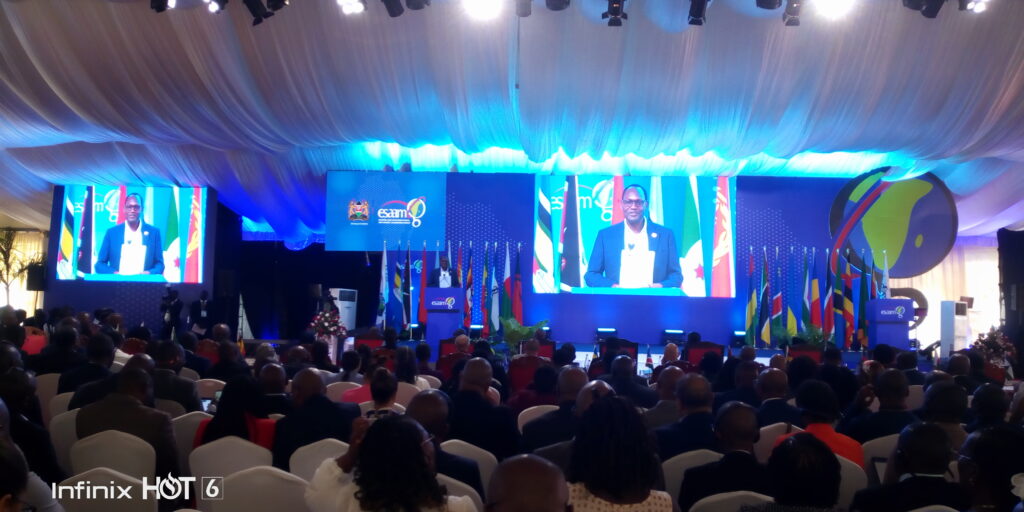By Mwanaharusi Rashid.
The Kenyan government, through the Ministry of National treasury, has announced a renewed commitment to addressing the pervasive issue of money laundering within its borders.
This move comes after the country was identified as one of those lagging behind in investigating and prosecuting individuals suspected of being involved in such illegal activities.
The government’s resolve was underscored during a recent high-level conference focused on combating money laundering across Eastern and Southern Africa, which is taking place in Diani, Kwale County.
Speaking at the launch of the Eastern and Southern Africa Anti-Money Laundering Group (ESAAMLG) conference, Dr. Chris Kiptoo, the Principal Secretary for National treasury, highlighted the government’s recognition of the significant threats posed by money laundering. He acknowledged that the illicit activity not only undermines the integrity of the financial system but also poses a serious security risk, particularly when laundered funds are used to finance terrorist organizations.
According to Kiptoo, the Kenyan government has identified several challenges that have impeded its efforts to effectively combat money laundering. These challenges include gaps in the legal and regulatory framework, insufficient resources allocated to law enforcement agencies, and a lack of coordination among various government departments.
However, Kiptoo assured attendees that the government is actively working to address these issues.
The conference being held in Diani brought together representatives from several Eastern and Southern African countries, all of which face similar challenges in dealing with money laundering.
The ESAAMLG, established to promote cooperation among member states in the fight against money laundering, serves as a vital platform for sharing best practices and developing coordinated strategies.
Kiptoo emphasized that regional cooperation is crucial, given the cross-border nature of many money laundering schemes. Criminal networks often exploit differences in regulatory standards and enforcement capacities between countries, making it essential for nations in the region to work together closely.
“We must strengthen our collective efforts to ensure that our financial systems are not used as conduits for laundering money and financing terrorism,” Kiptoo said. “The threat is not confined to individual countries; it affects the entire region, and we must therefore respond collectively.”
In response to these challenges, the Kenyan government is undertaking several initiatives aimed at bolstering its anti-money laundering (AML) framework. Among these is the revision of existing laws to close loopholes that have been exploited by criminals.
The government is also investing in the capacity building of its law enforcement agencies, ensuring that they have the necessary tools and training to investigate and prosecute money laundering cases effectively.
Kiptoo noted that the government is also enhancing its collaboration with international partners, including the Financial Action Task Force (FATF), to align Kenya’s AML regulations with global standards. This alignment is crucial not only for combating domestic money laundering but also for protecting the integrity of Kenya’s financial system in the global marketplace.
Additionally, the ministry is working on raising public awareness about the dangers of money laundering and the importance of reporting suspicious activities. By engaging the public and private sectors, the government hopes to foster a more robust culture of compliance and vigilance.
Kiptoo’s remarks at the conference underscored the broader implications of money laundering for African countries. He pointed out that the illicit flow of funds out of Africa, often through money laundering schemes, deprives the continent of critical resources needed for development.
Moreover, the financing of terrorist organizations through laundered money contributes to the destabilization of regions, exacerbating insecurity and hindering economic growth.
In conclusion, the Kenyan government’s commitment to tackling money laundering reflects a broader recognition of the need for stronger governance and enforcement mechanisms to protect the country’s financial system and national security.
As Kenya continues to strengthen its AML framework, it is also sending a clear message to criminal networks that the era of impunity is coming to an end.
The ongoing efforts, coupled with regional and international cooperation, are expected to yield significant results in the fight against money laundering, ensuring that Kenya and its neighbors remain resilient against this pervasive threat.


